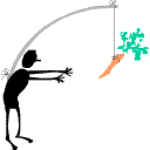
Organizing & Productivity Consultant
Certified Personal & Professional Coach
Paauwer
Tools is a Monthly Ezine
April, 2002
Issue 26

“Motivation
is what gets you started.
Habit is what
keeps you going.”
--Jim Rohn
When I get calls from prospective clients who say they want to get organized, I often ask, “What’s motivating you to get organized at this time, and what will be possible once you get organized?” I ask these questions because I’ve found that without a compelling reason, there’s little or no motivation to change the habits necessary for lasting results.
My first year in business, I got a call from a woman (I’ll call her Kelly) who said that her husband wanted her to get organized. As I walked through their home with her, Kelly told me what her husband wanted me to do. Among other things, he did not like the clutter scattered throughout the house -- stacks of unopened mail, piles of newspapers and magazines, unfolded laundry, and dirty dishes. After listening for a while, I asked, “Who owns the problem here?” With a bewildered look on her face, Kelly responded by telling me that her husband wanted her to “clean things up.”
Although Kelly was the one who was primarily responsible for creating the clutter, and she was the one who was asked to do something about it, I came to the conclusion that Kelly’s husband was the one who owned the problem. Why? Because he was the one who did not like the clutter, and she was perfectly content with the way things were. She was not the least bit motivated to change any of her personal habits that created the clutter in the first place.
Under
the circumstances, I decided not to take Kelly on as a client.
Although working with this client could have generated a significant number of
paid consulting hours -- as well as fostered a dependency on my ongoing
services to keep things organized -- I would have felt out of integrity
to work with Kelly when she was not ready to commit to the process. Without
her readiness to take ownership of the problem, my working with her would
not have helped in the long run. Had she and I de-cluttered and organized
their home, I’m convinced it would have reverted back to its original
state in a matter of weeks.
Who Owns the Problem?

I’ll
share a story to illustrate what I mean when I ask “who owns the problem.”
When our daughter was about four years old, I was the one who took her
to day care on my way to work. Every morning I’d ask her to get dressed
and be ready to leave the house by a certain time, and I’d give her a
10-minute and a 5-minute warning. And every morning when it was time
to go she would not be dressed. My husband and I were taking a parenting
class at the time, and I mentioned the problem in class one night. The
instructor asked, “Who owns the problem here?” I said, “I do, because
I am late for work.” He asked me why I was late for work, and I repeated
that I was late because our daughter would not get dressed on time. The
instructor asked what would happen if I let her own the problem.
The next morning when it was time to leave the house and our daughter was not
dressed, I put her in the car in her underwear, strapped her seatbelt
on, and put her clothes in a bag on the seat next to her. It was January
and it was cold in the car! Guess what? By the time we got to day care
she was completely dressed (and with her seatbelt still on)! The next
day she was dressed when it was time to go, and it was never an issue
again. From that day forward, she was ready on time. By
allowing her to own the problem, she had an investment in finding
a solution. She was motivated to get dressed because she was cold and
uncomfortable, and because I was no longer willing to own or solve the
problem for her.
Experience
has taught me that when someone says they want to get organized because
someone else wants them to do so, lasting results are not likely.
Why? Because without that internal motivation, one is not likely to
change the habits necessary to stay organized. If you don’t own the problem,
you won’t have a vested interest in finding a solution. Sometimes fear,
shame, or intimidation can generate temporary motivation, but it usually
doesn’t last.

The "inside-out" model of thinking represents a proactive model, which is based on accessing one's own internal wisdom and core values. The word "proactive" means more than merely taking initiative. Our behavior is a function of our decisions, not our conditions. We can subordinate feelings to values. These values form the core motivation that helps us take the initiative to make things happen. When we align our actions with the essence of who we are and what we value most, we are using the inside-out model. As each of us more fully honors our essential selves and our values, outer conditions begin to change, improve, and even transform.
Most people are motivated by one of two things: a desire to either increase pleasure or decrease pain in their lives. That’s what inside-out organizing is all about – getting clear about your internal desires...what you want more or less of in your life -- and then working outward to achieve the desired outcome. One of my colleagues, Julie Morgenstern, has written a bestseller about this titled Organizing from the Inside Out.
In Kelly’s case, although she has created the clutter problem, her husband owns it. Until she is ready to own the problem, nothing will change in their household. So how can Kelly become motivated to take ownership of the problem and do something about it? Let’s revisit the question, “What’s possible for Kelly once she gets organized?” To illustrate how this works, I’ve made up three scenarios in which Kelly could explore the answer to that question:
- Kelly and her husband sit down together and add up the actual costs of the clutter and disorganization -- late payment fees because the bills are not getting opened and paid on time, purchasing duplicate items because they can’t find what they need, paying for subscriptions to magazines they don't read, etc. Then they determine some alternative ways to spend the money they’ll save … perhaps for a vacation they’ve wanted to take, or for a home improvement Kelly wants that they cannot afford. Motivating factor: Freeing up more disposable income to use for things on the wish list.
- Kelly and her husband are both committed to caring for each other in meaningful ways. She recognizes that order is important to her husband and he is important to her. Therefore order becomes important to her for the sake of nurturing their relationship in a way that is meaningful to her husband. Motivating factor: Building a more satisfying relationship with her husband.
- Kelly has a hobby that she has not done for years because there’s no space in the house to work on it. She has a renewed energy and passion for resurrecting this hobby, and that serves as a motivation to begin de-cluttering their home. Motivating factor: Following a passion of hers and doing something she enjoys.
In each scenario above, Kelly might be motivated to change some habits if it’s worth the prize that awaits her on the other side of the clutter.
Being organized is not about how your environment looks, but about creating an environment and a schedule that enables you to work, play, and live exactly as you want to. Stephanie Winston, author of The Organized Executive, reminds us that “a good system expresses the organization of your mind in the environment.”
To assess your current level of organization at home, answer the following questions:
|
|
If you answered yes to these questions, you are doing just fine, even if your environment doesn’t look organized to others.
If you answered no to any of these questions, ask yourself what you would gain if you organized your time and your space around what’s most important to you. What opportunities do you miss out on or turn away because of a cluttered schedule, cluttered environment, or a cluttered mind? Click here to find out what disorganization costs you or your company.
Someone once said that “one definition of insanity is to keep doing the same thing and expecting different results.” If you were to get and stay organized, what different results would be possible? What will getting organized enable you to do that you are not doing now? Once you are clear about the answer to these questions, keep your eye on the prize and you’ll have the motivation to succeed!
When you are motivated to make a change in your environment and/or your schedule, I can help you get started. Click here to schedule a complimentary consultation or coaching session.
Copyright © 2002 Kathy Paauw, All Rights Reserved.